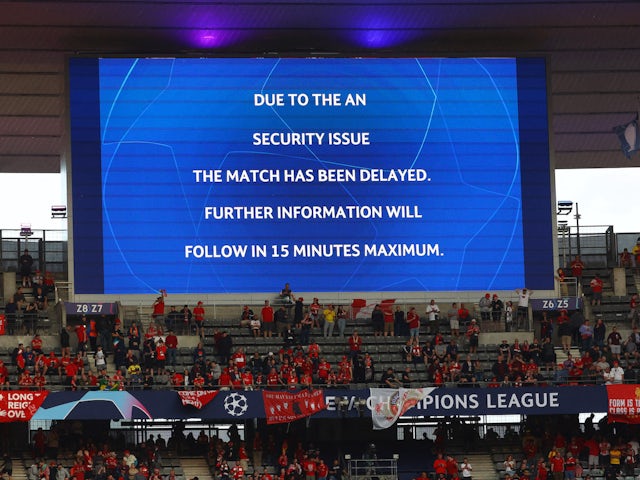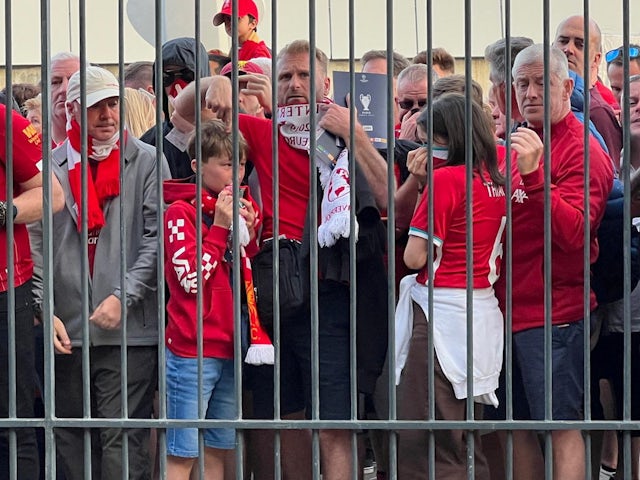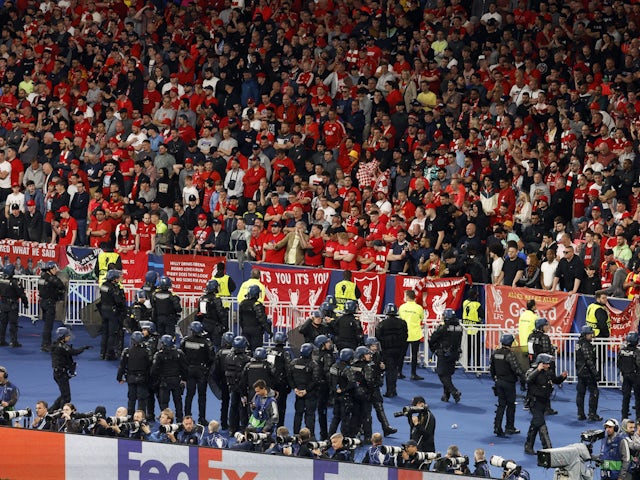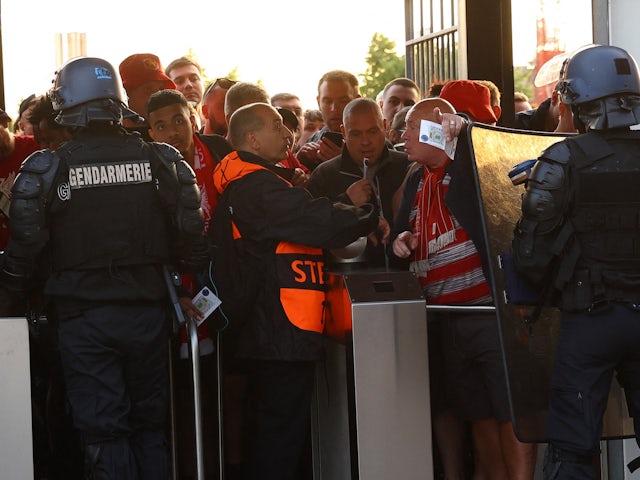The inquest into the chaotic and shambolic scenes which preceded the 2021-22 Champions League final has now begun, with two differing reports from the French authorities and those actually at the ground as to what happened.
I was one of the thousands of Liverpool fans that faced interminable queues, was tear-gassed indiscriminately for no reason and was treated with suspicion and disdain without any justification whatsoever.
It was my first Champions League final, and I attended as an excited fan hoping to be present for the crowning glory to an incredible season for Liverpool, and possibly a once-in-a-lifetime experience for me.
I was present at both the EFL Cup and FA Cup finals, where there was no trouble from either the Liverpool or Chelsea fans, and yet over in Paris we were treated as though English supporters had arrived at the peak of 1980s hooliganism.
In reality, it is the French game which has a serious problem with hooliganism at the moment, although the scenes at the Euro 2020 final at Wembley may have put the authorities on edge more than necessary if they expected rowdy English fans to turn up.
Even accounting for that very flimsy reasoning to any possible prejudice against the arriving fans, there is simply no excuse for how thousands of well-behaved Liverpool supporters were treated at the Stade de France.
I was also at the Euro 2020 final, and the Stade de France experience was a lot, lot worse - the result of the worst organisation I have ever seen at any event and baffling levels of incompetence at a stadium which is used to holding major events. I remember asking those around me over and over again: 'How could they get this so wrong?'
The changing story from the French authorities further undermines an argument which anyone in attendance already knows to be false.
The suggestion that kickoff was initially delayed due to the late arrival of fans was simply an outright lie; there is no way they could have believed that, when I was one of thousands who arrived three hours before kickoff and was trapped in an unmoving queue under an underpass for more than two of those hours, with absolutely no information as to what was going on.
 © Reuters
© Reuters
Riot police vans blocked much of the road, funneling all of those fans through a tight space long before we even got to the checkpoints at this bewildering bottleneck.
Once we finally got through that stage we had hoped that the queuing was over, but the ordeal had only just begun.
I was given Gate A to enter the stadium, and to get there we had to go past gates Y and Z, where the worst of the trouble happened.
Still with well over an hour before kickoff, we had to squeeze our way through an ever-increasingly busy crowd stuck at those two gates, with no movement as the police and stewards refused to let anyone through.
You had to use your arms to create space to move - and sometimes even to breathe - yet you were reluctant to take your hands out of your pockets having been repeatedly warned that pickpockets were patrolling the area and mixing in with the crowds.
This was, thankfully, before the main trouble began, but even when battling my way through the very back of the unmanned queue, as a Liverpool fan it was impossible not to think of Hillsborough and fear the worst. I remember thinking that if things did not change, something really bad could happen at Gate Z.
Once we finally got to Gate A, I also found myself in queue which was not moving, in front of a gate which was closed, and without any information as to what was going on.
 © Reuters
© Reuters
This was the case for over an hour - we arrived well before the teams were announced - and as kickoff approached, I was adamant that they had to delay the game due to how many Liverpool fans were yet to be allowed entry.
Once again, the decision to delay the kickoff was not announced outside the stadium at any point, with fans instead relying on word of mouth and news from phones.
It was in this queue that I witnessed a small group of five of six people climbing over the fences at the Stade de France and sprinting up the stairs into the stadium without going through the turnstiles.
I cannot say for certain that these were not Liverpool fans, but they were not wearing Liverpool shirts and appeared to be local youngsters; they certainly scaled the 15-foot high fences with an ease that suggested it was not the first time they had done so.
The Liverpool fans in the queue unanimously and vociferously made our displeasure at these actions known as it was obvious those idiots who broke in would only make things worse for the rest of us.
Our reward was to be tear-gassed by the riot police, even though at that stage anyone who had tried to scale the fence had already got over it. There were children and OAPs in our queue, all of whom suffered the effects of this tear gas.
I had to rely on news from friends and family as to what was happening with regards to the match, but the queue did finally start moving after more than an hour of not progressing an inch.
When I finally got to the front of the queue, another gang of around 10 locals tried to force their way in from the side, although fortunately they were repelled by the stewards.
In the end, I regard myself as one of the lucky ones; I got into the stadium pretty much when the match kicked off and so only missed a minute or two of the game itself, although the situation beforehand had robbed Liverpool fans of the build-up inside the stadium, the chance to belt out 'You'll Never Walk Alone' and to cheer their team onto the pitch for the biggest game of their season.
I was also lucky to avoid the horrific scenes I have since heard about after the match, when supporters were attacked, bottled and mugged by gangs outside the stadium when en route to the Metro station.
One suspects that the riot police which lined up in front of the Liverpool end before full time - again with no justification from what I had seen - would have been much more useful protecting those Liverpool fans on the way out of the stadium, although protection was far from their first thing on their minds.
I stayed behind to watch the trophy lift which I suspect may have seen me avoid the worst of the post-match scenes, although the pre-match ordeal was bad enough.
 © Reuters
© Reuters
As much as I tried to forget about it after making my way into the stadium, which at one point it looked far from certain would happen, a relative apathy at the final result in Liverpool's biggest game of the season was the main sign that what should have been one of the most memorable experiences of my life had been overshadowed by the events beforehand.
As if the treatment of Liverpool fans on the night was not bad enough, the treatment since - comments saying the fans had been "let loose" - have been disgraceful.
Suggestions that 40,000 supporters turned up to the Stade de France without tickets or with fake tickets is immediately disprovable for anyone in the city.
There may have been 40,000 Liverpool fans in Paris without tickets, but the vast, vast majority of those stayed in the fanzone, which was a 45-minute train journey away from the stadium - I know that to be true as my fiance was one of the tens of thousands who watched the game in the fanzone.
Incidentally, upon leaving the fanzone, supporters were also aggressively confronted by local fans who had travelled to the area seemingly with the sole intention of causing trouble.
It is important at this stage to note that I also know for a fact that some people did turn up with fake tickets, and I know that because one of those people proudly boasted about it to me the night before the match.
He had bought a fake for £50, knowing that it was fake at the time, but was willing to try his luck. In his own words: "I will either get in or I'll get carted away in a van, and I'm prepared for both."
This was a fan who had been to the European Cup finals in 1981, 1984, 1985, 2005, 2007, 2018 and 2019 - so certainly not a young supporter who perhaps did not know any better and not one for whom this final was a once-in-a-lifetime trip.
I pressed him on whether his fake ticket might prevent someone with a real ticket getting in, and how he could risk doing that to a fan with a genuine right to go to the game, to which he shrugged and suggested that he would give it a go anyway.
By the time we had actually got through the turnstiles the following day, I had heard two fans complaining that they were not being allowed in despite having genuine tickets.
I did not agree with the supporter I met with the fake ticket, and told him as much, but he was only one of the people I spoke to over the weekend, and was the only one with a counterfeit ticket.
So yes, there were fans with fake tickets, but that is also nothing new at sporting events, and often in the past a team which has taken a huge following to games has been praised rather than vilified for having such a loyal fanbase. And that still does not explain such an instantly-disprovable claim that 40,000 fans turned up at the Stade de France without tickets.
There is also a point to make here about both Liverpool and Real Madrid only being given less than 20,000 tickets each for a 80,000-seater venue, but that is an argument for another day.
All in all, the Liverpool fans behaved remarkably well on the day given the treatment they were subjected to.
The understandable anger and annoyance at the situation never once threatened to spill over into violence on their part, with the only violent actions I saw coming from the police. They were the hostile force, while Liverpool fans patiently dealt with something which everyone I spoke to unanimously agreed was their worst ever experience getting into a football match.
Credit must also go to the English media for the way they have covered it; football fans are often an easy target to pin the blame on given the history of trouble in this country, but they have portrayed an accurate image of a group of supporters simply trying to get into a football match but being met with a mixture of sheer incompetence, disorganisation, hostility and brutality.
It helped, in a way, that it was not just ordinary football fans caught up in the situation; legendary ex-players, friends and families of current players, celebrities and members of the media all suffered the same experience and have called out the organisers and authorities.
An independent review has now begun, but the weight of evidence against the heavy-handed tactics of the police and incomprehensible lack of organisation is surely too much to come to any other conclusion.
I had first-hand experience of it and it was every bit as shambolic, chaotic and disgraceful as it is being made out to be.
The French authorities must stop shifting the blame and instead look to learn from it, particularly with the Olympics and Rugby World Cup both coming to Paris in the next couple of years.
No Data Analysis info










